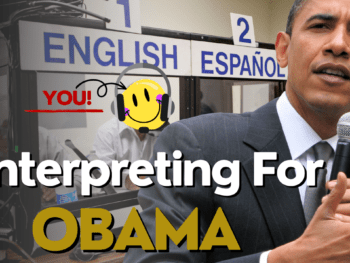Try this speech about economics and finance to practice your simultaneous and consecutive interpreting skills (note-taking): how are the Nobel Prizes funded? Note: The Speech starts STRAIGHT AWAY!
Topic(s): Economics, Finance
Terms: Nobel Prizes, award, Alfred Nobel, laureate, Swedish crown, bequeath, dynamite, inheritance, estate, securities, financial instrument, return on investment, portfolio, stocks, shares, real estate, bonds, debt, interest, inflation
Sources:
Also check these books to learn and practice interpreting.
Good For Practicing:
- Interpreting note-taking
- Consecutive Interpreting
- Simultaneous Interpreting
- Conference Interpreting
- Non-standard accent
- Finance & Economics Terminology
Also available on Speechpool.
If you’ve found this post helpful or think it could be useful to a friend who perhaps is – or is planning to become – an interpreter, please kindly consider buying me a coffee by using the button below:
I put all my heart and soul into the content I produce in order to help my fellow linguists set foot in the industry. Most of what I do is available to everyone for free.
Donating is 100% optional, but greatly appreciated. A short espresso will do! ☕
Script*:
*Please check the script only after you’ve done the note-taking exercise, otherwise that’s cheating! 🙂
‘The Nobel Prizes are one of the most prestigious awards in the world. First awarded in 1901, they are named after Alfred Nobel who, in his will, envisioned the creation of five yearly prizes to reward people (or sometimes institutions) who have excelled in one of the following fields: Literature, Physics, Medicine, Chemistry and Peace.
For more than 100 years, the Academies, Institutes and Committees responsible for presenting the different Nobel Prizes have been rewarding new laureates every year.
Each laureate, in addition to having their work recognised all across the world, receives a gold medal, a diploma and – most importantly for the purpose of this speech – a monetary award of 10 million Swedish crowns. In case you’re wondering, that’s almost 1 million dollars.
In other words, considering there are 5 separate prizes, in a normal year the Nobel Foundation awards a total of almost 5 million dollars. One thing I’ve always wondered is: where does this money come from? Alfred Nobel, who died very wealthy, bequeathed all his wealth to establish the Nobel prizes; however, he died in 1896. How come the Foundation is still capable of giving away such a substantial amount of money every year after more than a century?
So, let’s get back to the start. Alfred Nobel was a Swedish scientist and businessman who made his fortune after inventing the dynamite. When he died, his family was expecting to inherit the entirety his estate… however, reality was about to hit them hard in the face!
In his will, rather than transferring his incredible wealth to his family, Alfred Nobel decided to give it to a soon-to-be-created foundation that would become responsible for investing the bulk of his assets in quote-unquote “safe securities”. The profits resulting from such investments would then be used to fund the Nobel Prizes. As you can imagine, his family members weren’t too pleased with this decision…
Just in case you’re wondering, a financial security is pretty much any form of financial instrument in which a person can invest their money. For instance: when you invest in the stock market, you are allocating your money to a financial security of some sort with the expectation of getting a financial return on your investment.
Now, I am not exactly a specialist in Finance, so I won’t go into detail here. But to sum up: the Nobel Foundation continues to be able to pay such large sums of money thanks to the profits resulting from the investments made with Alfred Nobel’s inheritance.
Currently, their portfolio consists mostly of stocks. In other words, more than 50% of the fund is invested in companies: they own a ton of shares from many different companies around the world.
The rest is invested in things such as real estate (I think most of us know what that is) and bonds (which are issued by companies and governments as debt; essentially, you lend money to a company or government, and they pay that money back to you years later, plus interest).
Alfred Nobel left the Foundation a tremendous fortune, but if they had not invested that fortune, the money wouldn’t have lasted more than few decades. It’s simply too much money being awarded every year, and more than 100 years of inflation would have completely eroded the value of his estate.
So, the existence of the Nobel Prizes is totally dependent on the successful management of this fund created with Alfred Nobel’s fortune. If the Foundation were to fail in this task, the Prizes could very well just cease to exist. Let’s hope that never happens and the prizes continue to be awarded for centuries to come.’














 Interpreting Training Exercise | The Happiest Country
Interpreting Training Exercise | The Happiest Country